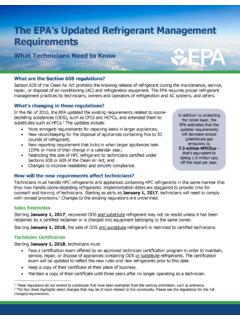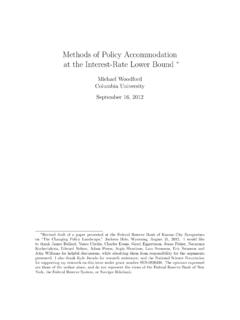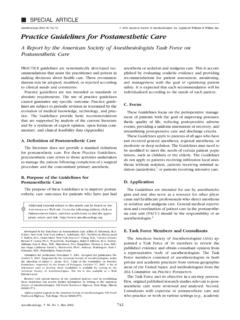Transcription of Privatization of State Foster Care and Adoption Services ...
1 1 April 3, 2007 More Information: F. Scott McCown, No. 288 Privatization of State Foster care and Adoption Services An Idea Whose Time Has Come or a Disaster in the Making? Child Protective Services (CPS) in the Department of Family and Protective Services (DFPS) employs specialists who recruit, train, and monitor Foster and adoptive parents and complete adoptions. CPS also contracts with private providers for these Services . Some argue that the State should maintain this public-private system. Others argue that the State should use only private providers. This Policy Page explores the pros and cons of each approach. Our major findings include: At a time when we have children sleeping in State office buildings, Privatization will make our Foster - care capacity crisis worse; Rapid Privatization will force children out of their homes, move children into more crowded homes, and compromise their care ; At a time when we have over 4,000 children available for Adoption but without an adoptive home, Privatization will make our Adoption capacity crisis worse; Privatization cannot possibly be accomplished in 24 months; and Privatization will cost far more than the State has calculated.
2 Te r m i n o l o g y Recruiting, training, and monitoring Foster parents and adoptive parents goes by the name substitute care Services , referring to substituting for the care of a biological parent. The public employees who do this work are called FAD workers, for Foster and Adoptive Home The private providers who do this work are called Child Placing Agencies (CPAs). What does current law require? In Senate Bill 6, the 79th Legislature required the Privatization of all Foster and Adoption Services by September 1, 2011. SB 6 is now current law. Unless the legislature amends current law, the Department of Family and Protective Services (DFPS) must implement this mandate.
3 In other words, CPS will have to reassign or terminate the public employees who provide substitute care Services and contract with private providers for all Services by September 1, 2011. What is the legislature considering? The Senate is considering Committee Substitute Senate Bill 758,2 which not only continues the current law mandate to privatize all Foster and Adoption Services , but also moves the completion date up to September 1, 2009. The House has not yet held hearings on a specific bill, but several bills are pending that addressing this issue, including a companion bill to SB The House will hold hearings in early April. 2 How does this relate to case management? Privatizing substitute care Services is altogether different from privatizing case management.
4 When the State outsources substitute care Services , it contracts for recruiting, training, and monitoring Foster and adoptive homes and completing adoptions. When the State outsources case management, it contracts for decisionmaking about children in the State s care . SB 6 also mandated the Privatization of case management. Under SB 6, privatizing all Foster and Adoption Services is necessary to privatize case management because SB 6 names the private provider of substitute care Services for a child as the case manager. Since SB 6 requires the State to outsource all case management by September 1, 2011, it therefore had to require the State to outsource all substitute care Services by September 1, 2011.
5 CSSB 758, however, proposes a pilot of case management, leaving the 81st Legislature the opportunity to evaluate the pilot and decide whether privatizing case management is advantageous. If the legislature adopts this approach, it would not be necessary to rush to privatize all substitute care Services . What is the thinking behind privatizing all Foster and Adoption Services before learning the results of the case management pilot? CSSB 758 s author, Senator Jane Nelson (District 12--Denton and Tarrant), Chair of the Senate Health and Human Services Committee, gives three reasons for privatizing all Foster and Adoption Services by September 1, 2009: Improving Services Focusing CPS on its core mission Eliminating any conflict of interest between Licensing and CPS This policy page examines these claims.
6 Does Privatization improve Services ? While some private providers claim that privatizing will improve Services to children and families, we have not seen any evidence that on average the Services of private providers are superior to those of CPS. In our judgment, Privatization will hurt Services , particularly the effort to rush to privatize by September 1, 2009. Texas has a Foster - care capacity crisis Texas already has a Foster - care capacity crisis. As the chart below and the table on the top of the next page show,4 children are entering Foster care much faster than the system is creating new Foster homes, leading to crowded homes and inappropriate placements. Foster Capacity Crisis05,00010,00015,00020,00025,00030,0 00200120022003200420052006200720082009 CPS HomesCPA HomesFoster KidsDFPS Projections In reviewing these numbers, one might conclude that CPAs are doing a better job than CPS in opening Foster homes, but this does not account for the effect of adoptions, as explained below.
7 State spending to build capacity has been flat Texas did not put additional money into building Foster care capacity, either public or private, in the last session and is not planning to do so this session. By 2009, caseloads for FAD workers will be up 47 FAD Worker Caseloads 3 200113,729 3,9873,7927,779200214,843 , , , ,709 , , , ,109 , , , ,113 , , , ,942 , , , Kids% Growth since 2001 CPS HomesTotal Homes % Growth since 2001 CPS Homes % Growth since 2001 CPA HomesCPA Homes % Growth since 2001 Total Homes Rapid Privatization will make the crisis worse During the next 24 months, instead of recruiting and training new homes, our State workforce will be looking and leaving for new jobs. The State experienced this same sort of disruption under the Accenture contract when it tried to privatize enrollment and eligibility determination for public benefits.
8 In addition to losing State workers, CPS Foster parents may also quit. CPS Foster parents have chosen to work for the State rather than a private provider. If the State forces them to go through a difficult transition to a private provider, many may just quit, severely diminishing capacity. The State has not included these volunteers in its planning or done any preparatory work for a transition. Rapid Privatization would disrupt children s lives Indeed, a major disadvantage to rapid Privatization is that it would cause terrible disruptions to children. If a CPS Foster home is unable or unwilling to transfer to a private provider, a child will lose his or her home.
9 Even if Foster parents are willing to move from CPS to private providers, private providers will have different managers, therapists, and doctors, disrupting the continuity of care to children. A mandate to privatize in 24 months would have tragic consequences for children. Private providers cannot build needed capacity During the debate about Privatization , some have observed that private providers account for 80 percent of all Foster homes and inferred that providing the other 20 percent should be easy. Unfortunately, a misunderstanding about the 80/20 ratio has led to this erroneous conclusion. CPA and CPS homes serve different populations.
10 CPS homes tend to be Basic Foster Family Homes, providing Foster care for typical children. CPA homes tend to be specialized, providing therapeutic Foster care . Historically, CPAs have been less willing to provide basic Foster care because the rate does not cover costs. Basic $ $ $ $ $ $ $ $ To Foster FamilyRate to CPA Cost studies show that basic and moderate rates cover about 80 percent of a CPA s cost, while specialized and intense cover closer to 100 If the State were successful in transitioning all its basic homes to CPAs, it would be a massive cost shift to private providers. Even though private providers do provide some basic care now, it is unrealistic to think that private providers could or would sustain such a large cost shift.








